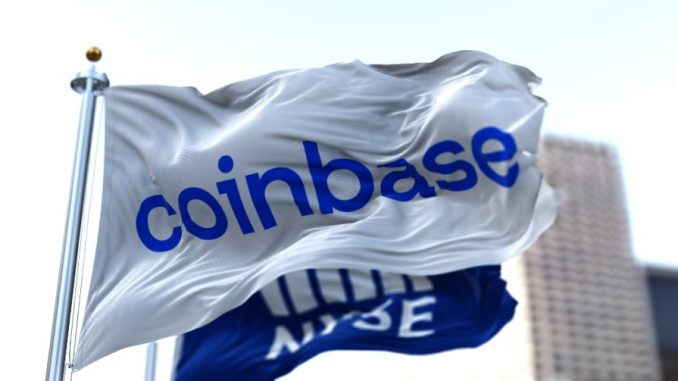
Put an arm around a Coinbase investor today.
CEO and founder Brian Armstrong has announced he is selling 2% of his stake, in what amounts to another blow to the embattled cryptocurrency exchange.
Coinbase going public was seminal moment for crypto
Coinbase, which is the world’s second-largest cryptocurrency exchange, was the guinea pig for crypto.
The company eschewed the traditional route – the IPO – and instead pursued a direct listing, when its shares floated on the Nasdaq stock exchange in April 2021. But it wasn’t merely the method of listing that was somewhat novel; it was the fact it was going public in the first place.
It represented crypto taking its seat at the big table. No crypto company had before gone public, and it came amid a time when every coin under the sun was yielding outrageous returns for investors.
It seems a long time ago now. Bitcoin opened at $59,000 that morning. Jerome Powell’s printer was red hot. Boomers were asking their children how to buy something called Dogecoin.
Coinbase went public that morning, and closed its first day of trading at $328 per share. That valued the crypto behemoth at close to $86 billion. The good times were rolling.
Crypto had arrived.
Performance since IPO
And just as soon as Coinbase arrived, it fell.
As I write this, it is trading at $63. That’s an 83% meltdown from its listing, now valued at $16.6 billion. Even the wounded Bitcoin has outperformed it since then, as I plotted below.
So where did it all go wrong? Well, I suppose the first thing is the volatility. We should not be surprised that a share such as Coinbase is capable of shedding so much value so quickly. Its performance is – and always will be – symbiotic with crypto.
If crypto drops, interest in the markets plummets. Everybody wants in when their friends are tweeting about 100X returns. That means less volume, trading fees and ultimately worse performance for Coinbase.
With crypto’s peerless volatility, it should not be a surprise that Coinbase is so volatile. This was what I said at the time about it: it makes sense to buy Coinbase stock if you are an institutional investor looking for crypto and for whatever reasons – regulatory, bureaucracy etc – you cannot purchase Bitcoin directly.
Or perhaps you are an older investor, (understandably) intimidated or not as comfortable transacting in the crypto markets directly, with regards to self-custody / setting up a wallet etc. For this demographic, if looking to gain crypto exposure, it made (makes) sense to purchase Coinbase stock.
However, for anyone else, why not just buy Bitcoin directly? Why go via the Coinbase route; what advantage does it hold?

CEO sells 2% of stake
Founder and CEO Brian Armstrong holds a 19% stake in the company, worth about $3.2 billion. Soon, that will be a 17% stake, following his announcement he is selling some.
“I’m passionate about accelerating science and tech to help solve some of the biggest challenges in the world. To further this, I’m planning to sell about 2% of my Coinbase holdings over the next year to fund scientific research and companies like NewLimit + ResearchHub”
His reasons seem sound, in fairness. However, no matter what way you swing this, it’s a blow to Coinbase to have their CEO dump stock – just like it is a blow when any insider sells.
Sure, there are personal reasons why one may want to divest – I certainly would not want to have 19% stock as part of my portfolio – but the reasoning by Armstrong that he wants the money to donate does not change the fact that this is still a sell order by Coinbase’s CEO.
There are many ways to monetise stock holdings, which executives take advantage of all the time. Look no further than Elon Musk, who is famously reluctant to sell Tesla stock, instead placing it as collateral in financing packages, or using other avenues to generate cash flow.
Armstrong posted his sell order last Friday on Twitter, appending it with the comment that is “sharing this because he wants you to hear it from me first”, before insisting that “I intend to be CEO of Coinbase for a very long time and I remain super bullish on crypto and Coinbase”.
For the avoidance of doubt, I intend to be CEO of Coinbase for a very long time and I remain super bullish on crypto and Coinbase. I’m fully dedicated to growing our business and advancing our mission, but I am also excited to contribute in a different way.
— Brian Armstrong (@brian_armstrong) October 15, 2022
The future for Coinbase
This is just the latest blow for Coinbase.
In June, Armstrong announced the company would be laying off 18% of its workforce, approximately 1,100 of its 6,100 employees, as the crypto markets continued to lag, hurting Coinbase’s bottom line. For comparison, its competitor FTX, which overtook Coinbase in May for trading volume for the first time, still has an employee count of only 300.
The downsizing also came only four months after the SuperBowl, when Coinbase notoriously spent $14 million on a halftime commercial. It posted a net loss that quarter of $430 million, with shares sliding 36% – and this was before the immense contagion sparked in May that really took the crypto markets for a tailspin.
Armstrong admitted the company had expanded too quickly, but it was really a case of extremely poor planning. The crypto markets are famously temperamental, and with the pandemic boom leading to stimulus cheques, more disposable income for those locked at home, and more time at the computer given the lack of socialising and effects of quarantine, the 2020 and 2021 markets were the perfect cocktail for a Coinbase run-up.
Armstrong bet big on this continuing, but the world had other ideas. Inflation eventually came to bite, following more printing of cash than at any point in history. And with rampant inflation comes interest rate hikes, sucking liquidity out of the markets, bloated gains disappearing from stocks, and forward cashflows getting discounted at harsher rates.
It is now the exact opposite of that perfect COVID macro situation. Coinbase will need to consolidate, plan better and hope that the economy can get its act together. Because crypto is not bouncing until that happens. And if crypto doesn’t bounce, Coinbase certainly won’t.
The dog wags the tail, don’t you know?






Be the first to comment